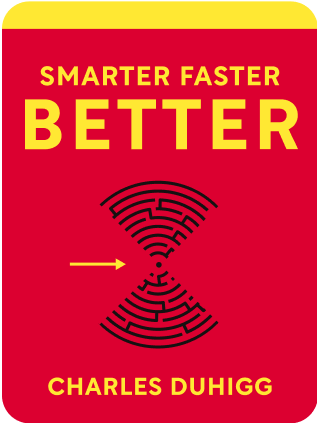

This article is an excerpt from the Shortform book guide to "Smarter Faster Better" by Charles Duhigg. Shortform has the world's best summaries and analyses of books you should be reading.
Like this article? Sign up for a free trial here .
Do you have a lot to do, but you don’t feel like doing it? Do you struggle with finding motivation?
In Smarter Faster Better, Charles Duhigg discusses the link between motivation and productivity. He provides two reasons why finding motivation is crucial in getting things done. He also shares two actions you can take to make motivation a habit.
Read more to discover the keys to finding motivation and getting more done.
Finding Motivation Is Within Reach
A concept that is crucial in increasing your personal productivity is finding motivation.
Motivation is, in short, having the enthusiasm and drive to do something. It’s a crucial factor in being productive for two reasons. Firstly, if you don’t have the motivation to do something, you’re less likely to do it efficiently or well (or, in extreme cases, at all.) Secondly, if you’re demotivated, you’re more likely to procrastinate tasks and become paralyzed by inactivity. Consequently, your productivity will suffer.
Being able to self-motivate is becoming an increasingly important skill in the modern economy. Currently, more than a third of working Americans are self-employed, and this figure continues to rise. When you’re self-employed, you have no boss to motivate you. You have to set your own goals, manage your own time, and make your own choices. To do this effectively, you need a degree of self-motivation.
Unfortunately, finding motivation is something that many people struggle with. We can all recall the feeling of knowing that we need to do something, but fundamentally not wanting to do it!
Those of us who’ve turned to self-help materials in our quest to become more motivated have often been met with the assertion that motivation is a personality trait that we either have or we don’t. Likewise, it’s frequently assumed that finding motivation is a subconscious process in which our brain compares the effort of a task against its potential reward.
These ideas have framed motivation as something that you can’t necessarily change; it’s already ingrained in your personality or brain chemistry. However, the reality is more complex—and optimistic—than this. You can learn how to be motivated. Finding motivation is more comparable to a skill than a static trait; it’s a muscle to be flexed and strengthened.
But how can you develop motivation? Research has revealed two key actions that you can take:
- Making choices that help you to feel in control
- Finding meaning in your choices
The more you put these actions into practice, the easier it becomes to make motivation a habit.
(Shortform note: For more on creating new habits, read our summary of Charles Duhigg’s The Power of Habit.)
Find Motivation by Feeling in Control of Your Life
Researchers have suggested that there is a strong link between feeling in control and feeling motivated. Studies have shown that when we feel in control, we experience increased activity in the striatum—an area of our brain that is believed to drive motivation.
Feeling in control of your life gives you confidence, increases your drive, and makes you more willing to push your limits. But what can you do to generate a feeling of control?
The answer lies in making choices. According to researchers at Columbia University, making a choice instills a sense of control in us—even if the choice doesn’t actually offer any tangible benefits.
Your choice only has to be small: for instance, you might choose which email in your flooded inbox to respond to first, or decide the location of a meeting that you need to arrange. In many ways, the details of your choice don’t matter. It’s the act of choosing that gives you a feeling of control, and, by extension, a feeling of motivation.
Making Subversive Choices
Duhigg suggests that making a subversive choice—one that breaks the rules or challenges the status quo in some way—may be particularly powerful in establishing a feeling of being in control of your life.
Acts of rebellion strengthen what psychologists call your “internal locus of control”; your belief that you control your own life and destiny. By breaking the rules, such as rearranging the furniture in your senior living home when you’re not supposed to, you’re reminded that you have agency and don’t have to blindly follow others’ guidelines.
If you develop a strong internal locus of control, you’re more likely to believe that your actions will make a difference to your life. Because of this, you’re more likely to succeed at self-motivation. It’s much easier to motivate yourself to complete a task if you genuinely believe that it will improve your life.
Making these subversive choices can be daunting, especially if you’re not used to breaking the rules. Likewise, witnessing others—your children, your friends, or others around you—making subversive choices can be exasperating and hard to accept. For example, dealing with a toddler who’s making the subversive choice to refuse to eat their dinner is going to frustrate you.
However, Duhigg argues that you should push through this discomfort and make, support, and reward subversive choices as much as possible. This will enable you to strengthen your own and others’ internal locus of control, thus increasing your or their ability to self-motivate.
Example: Answering Your Emails
Here’s a day-to-day example of how making choices can put you in control and generate motivation.
Imagine you’ve got an intimidatingly full email inbox, but you have no motivation to reply to any of the messages. Set yourself the task of choosing one email to reply to first. It could be the simplest message to resolve or the one that requires the shortest reply.
In doing this, you’ll have decided where you want to start. You’ll have asserted some control over the situation, and you’ll feel more motivated to complete your task.
Find Motivation by Finding Meaning
We’ve considered the positive effect that making choices to gain control has on your motivation. However, sometimes making choices alone is not enough to generate motivation. This is often the case if a task is particularly challenging or unpleasant.
In such cases, you need something else to push you towards action. This added factor is finding meaning in your choices.
To find the meaning in your choice, link it to a higher purpose or goal; to something bigger than itself. Put your choice and your task in context. You can do this by asking yourself why you’re actually completing the task. Finding the “why” serves as a reminder that as difficult or unpleasant the task may be, it will benefit you in the long run and help you to advance your goals. If you keep this fact in mind, finding motivation—and retaining motivation—are more likely to happen.
Example: Motivation in the US Marine Corps
Finding meaning in your choices and actions is a motivational technique used in the US Marine Corps, as discovered by one recruit, Eric Quintanilla, during his basic training.
During training, Quintanilla’s drill instructors instructed the recruits to, in moments of struggle, ask themselves questions that began with “why.” This helped them to get to the root of why they were doing what they were doing. Once they identified the purpose of their task, they felt more motivated.
For Quintanilla, this method came into play during “The Crucible.” The Crucible is the final task in the Marine Corps’ basic training. It’s a notoriously demanding three-day challenge featuring obstacle courses that stretch for 50 miles. The closing stretch of the Crucible involves climbing the Grim Reaper, a steep and difficult hill.
As Quintanilla and his fellow recruits struggled up the Grim Reaper, they put their drill instructors’ recommendations into practice. One of Quintanilla’s pack buddies asked him why he was climbing the hill and completing the Crucible.
For Quintanilla, the answers were clear. Firstly, he wanted to finish his training and become a Marine. Secondly, he wanted to do this for his family; not only to improve his family’s lives by gaining a stable career but also to finally see his newborn daughter.
Quintanilla linked the difficult task of climbing the hill to a higher purpose, giving him the motivation to carry on. He completed the Crucible successfully and was able to begin his career in the Marine Corps—and meet his baby daughter.
Finding motivation to do what you need to do is within reach. The keys are in making choices that help you to feel in control of your life and finding meaning in your choices.

———End of Preview———
Like what you just read? Read the rest of the world's best book summary and analysis of Charles Duhigg's "Smarter Faster Better" at Shortform .
Here's what you'll find in our full Smarter Faster Better summary :
- Why becoming more productive isn’t about working longer hours or constantly pushing yourself to do more
- The 8 principles for improving productivity
- How to create a work culture in which each employee is truly valued






